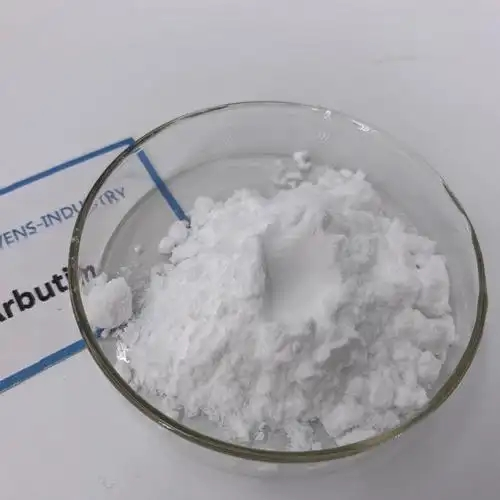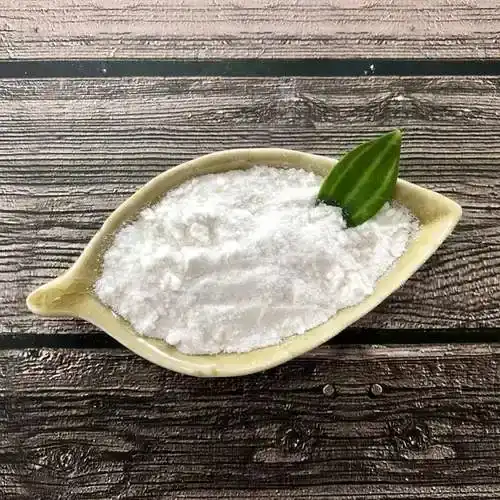How Beta Arbutin Fades Dark Spots Safely?

Beta arbutin, a glycosylated hydroquinone extracted from bearberry plants, offers a gentler approach to skin lightening compared to its synthetic counterparts. Its mechanism of action involves inhibiting tyrosinase, an enzyme crucial in melanin production. By modulating melanin synthesis, beta arbutin effectively fades dark spots and evens out skin tone without the harsh side effects associated with more aggressive skin-lightening agents.
The safety profile of Beta arbutin powder is particularly noteworthy. Unlike hydroquinone, which has faced scrutiny due to potential long-term risks, Beta arbutin powder provides a more tolerable option for those seeking to diminish hyperpigmentation. Its natural origin and slower release of active compounds contribute to its reputation as a safer alternative for continuous use.
The safety profile of Beta arbutin powder is particularly noteworthy. Unlike hydroquinone, which has faced scrutiny due to potential long-term risks, Beta arbutin powder provides a more tolerable option for those seeking to diminish hyperpigmentation. Its natural origin and slower release of active compounds contribute to its reputation as a safer alternative for continuous use.
Research indicates that beta arbutin's efficacy in reducing melanin content is dose-dependent. Higher concentrations tend to yield more pronounced results in lightening dark spots and overall skin brightening. However, it's essential to note that the optimal concentration may vary depending on individual skin types and specific formulations.
Beta Arbutin vs Alpha Arbutin: Key Differences
While both beta and alpha arbutin are derived from the same source, they exhibit distinct characteristics that influence their effectiveness in skincare applications. Beta arbutin, the natural form found in plants, is more stable than its synthetic counterpart, alpha arbutin. This stability translates to a longer shelf life and potentially sustained efficacy over time.
Alpha arbutin, on the other hand, is synthetically produced and boasts enhanced solubility. This property allows for better penetration into the skin, potentially leading to more rapid results. However, its increased instability may result in faster degradation, particularly when exposed to heat or light, unlike the more stable Beta arbutin powder.
Alpha arbutin, on the other hand, is synthetically produced and boasts enhanced solubility. This property allows for better penetration into the skin, potentially leading to more rapid results. However, its increased instability may result in faster degradation, particularly when exposed to heat or light, unlike the more stable Beta arbutin powder.
In terms of potency, alpha arbutin is generally considered more effective at inhibiting tyrosinase activity. Studies have shown that alpha arbutin can be up to 10 times more potent than beta arbutin in reducing melanin production. This heightened efficacy makes alpha arbutin a popular choice in professional-grade skincare products targeting stubborn hyperpigmentation.
Despite these differences, both forms of arbutin offer skin-brightening benefits with minimal risk of irritation. The choice between beta and alpha arbutin often comes down to individual skin concerns, product formulation, and personal preferences.
Daily Use of Beta Arbutin for Glowing Skin
Incorporating beta arbutin powder into your daily skincare routine can contribute to a more luminous complexion over time. To maximize its benefits, consider the following tips for optimal usage:
- Consistency is key: Regular application of beta arbutin-containing products is essential for noticeable results. Most users observe improvements in skin tone and texture after 4-8 weeks of consistent use.
- Pair with complementary ingredients: Beta arbutin works synergistically with other skin-brightening agents such as vitamin C, niacinamide, and kojic acid. These combinations can enhance overall efficacy and provide comprehensive skin benefits.
- Sun protection is crucial: While using Beta arbutin powder, it's imperative to apply broad-spectrum sunscreen daily. UV exposure can counteract the skin-lightening effects and exacerbate hyperpigmentation. While using Beta arbutin powder, it's imperative to apply broad-spectrum sunscreen daily. UV exposure can counteract the skin-lightening effects and exacerbate hyperpigmentation.
- Start with lower concentrations: If you're new to beta arbutin, begin with products containing lower concentrations (around 1-2%) to assess your skin's tolerance before progressing to higher strengths.
- Layer appropriately: Apply beta arbutin-infused products after cleansing and toning but before heavier creams or oils. This ensures optimal absorption and efficacy.
When used consistently and in conjunction with a comprehensive skincare regimen, beta arbutin powder can contribute to a more radiant, even-toned complexion. Its gentle nature makes it suitable for various skin types, including those with sensitive skin prone to irritation from harsher lightening agents.
Conclusion
Beta arbutin powder offers a promising solution for those seeking to improve skin health and address hyperpigmentation concerns. Its natural origin, safety profile, and efficacy in modulating melanin production make it a valuable ingredient in modern skincare formulations. While it may not provide the rapid results of more aggressive skin-lightening agents, its gentle approach allows for long-term use with minimal risk of adverse effects.
As with any skincare ingredient, individual results may vary, and it's advisable to consult with a dermatologist or skincare professional to determine the best approach for your specific skin concerns. For those interested in exploring high-quality beta arbutin powder or other plant-based extracts for skincare applications, Xi'an Jiubaiyuan Biotechnology Co., Ltd. offers a range of botanical ingredients tailored to meet diverse formulation needs. To learn more about our products and how they can enhance your skincare offerings, please contact us at emily@jiubaiyuanbiotech.com.

